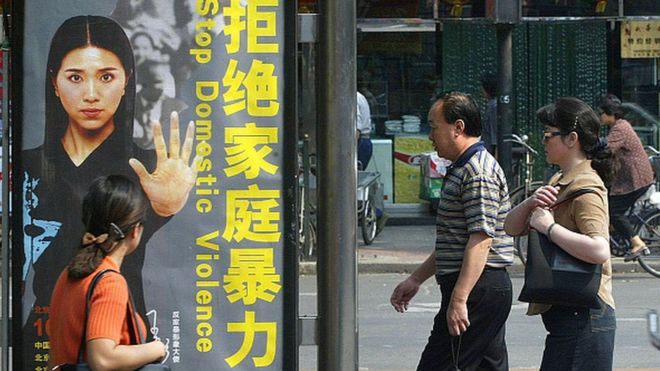A city in eastern China is introducing a system that lets people getting married check if their partner has a history of abuse.
Yiwu, in Zhejiang province, is launching an inquiry service that will be available to residents from 1 July.
Popular news website The Paper says that people who are arranging to get married will soon be able to fill out a form, and see if their partners have any history of violence, "either between family members or during cohabitation".
All they need to do is provide a formal form of ID, and personal information on the person they are set to marry.
One person is allowed to make a maximum of two inquiries a year, it is reported.
Praise online
Zhou Danying, a member of the women's federation in the city, has welcomed the move, saying the system will help protect people in the city from domestic violence.
She told The Paper that the Domestic Violence Register database will begin by using information provided by the courts and public security organs from 2017 onwards.
The China Daily newspaper also notes approval from law professor Han Jin, who says this system "protects a person's right to be informed about the personality of their significant other before tying the knot".
The system has also been praised on Chinese social media, with many on the popular Sina Weibo microblog calling for it being rolled out nationwide.
Some say the new system should also include child abuse, noting that it is geared towards giving transparency of beatings and physical abuse, rather than sexual violence.
Domestic violence in China
There have been growing calls in China in recent years to recognise and hold accountable people who have a history of domestic violence.
Before 2001, physical abuse was not even grounds for divorce. Laws only came into effect making domestic violence punishable by law in March 2016.
Concerns about victims of domestic violence have been growing amid lockdowns during the Covid-19 epidemic. News website Sixth Tone noted police reports on domestic violence doubled or tripled in some areas while citizens were under lockdown.
Last month, fears about domestic violence victims grew after China made it more difficult for couples to divorce, introducing a new 30-day "cool-off" period to allow both parties time to rethink their decision.
Social media users at the time voiced fears that the law could lead to some people being coerced into backtracking, and it could deter victims from speaking out or leaving violent relationships.
The law, which will come into effect at the beginning of 2021, is not applicable to families with a history of domestic violence, however there were also concerns that not all cases can be detected.
Latest Stories
-
Against all odds: Zinabu Issah clinches silver for Ghana at WPA Marrakech 2025
36 minutes -
ASFC 2025: Ghana girls complete host-and-win mission after beating Uganda
39 minutes -
NPC President congratulates new GOC Executives
41 minutes -
Stonebwoy displays maturity amid Aisha Modi’s attacks: a masterclass in brand integrity and respect
55 minutes -
Afro-Arab Group CEO commends Kwahu Business Forum
1 hour -
CAF President Motsepe vows action against rising stadium violence
1 hour -
You’ll be prioritised for jobs in next NPP government – Bawumia to dismissed workers
2 hours -
Lola Hair and Beauty College officially launched to promote TVET
2 hours -
Minority condemns sacking of TTH CEO, demands Mahama reprimand Health Minister
2 hours -
Extraordinary photos from the funeral of Pope Francis
3 hours -
Pope Francis laid to rest after Vatican funeral service
3 hours -
Our polling station executives and grassroots are our greatest assets, I thank them – Bawumia
3 hours -
Trump questions Putin’s intentions after meeting with Zelensky ahead of Pope’s funeral
3 hours -
IACG targets 1,000 market traders and artisans in Western, Western North Regions as part 2025 Micro Business Clinics
3 hours -
Ghanaians should be worried about undermining the judiciary – Ex-Deputy A.G.
3 hours

